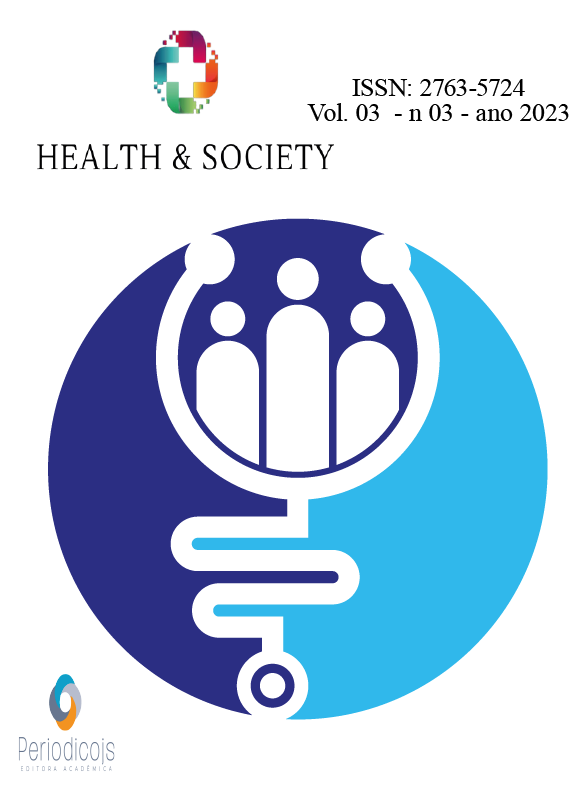Resumo
Context: With the COVID-19 pandemic, there was an abrupt change in teaching. It is important to analyze the distance education methods used, as there is a need for students to develop skills in direct contact with the client/community. Objectives: to examine and map the scientific evidence on the changes in the teaching of nursing students with the emergence of the pandemic. Methodology: Scoping Review inspired by the principles advocated by the Joanna Briggs Institute, allowed the analysis of articles, establishing the guiding question: “What is the impact of the COVID-19 pandemic on the education process of nursing students?”. Searches were carried out in 3 international databases, in a total of 40 studies, and 17 studies were selected for abstract reading and 1 article from Gray Literature was included, leaving a final sample of 9 studies. Results: The 9 studies analyzed show that the attitude of students towards the abrupt change to distance education is negative and forced teachers to use different teaching strategies, using technology. Conclusion: In the future, it will be possible to develop different education models, as well as specific methods using telenursing and the development of an integrated virtual reality simulation program, or even the development of a hybrid model.
Referências
Amendoeira, J. (2004). Entre Preparar Enfermeiros e Educar em Enfermagem uma Transição Inacabada. [tese de doutoramento]. Faculdade de Ciências Sociais e Humanas da Universidade Nova de Lisboa https://repositorio.ipsantarem.pt/handle/10400.15/92.
Amendoeira, J. (2009). Ensino de Enfermagem Perspetivas de Desenvolvimento. Pensar Enfermagem, 13, 2–12. https://comum.rcaap.pt/bitstre/2009_13_1_2-12%282%29.pdf.
Cecília, M., Almeida, P., Almeida, M. C., Almeida, P., Martins Mishima, S., Martins, S., Bistafa, M. J., José, M. & Pereira, B. (2009). Enfermagem enquanto disciplina: que campo de conhecimento identifica a profissão?. Revista Brasileira de Enfermagem, 62(5), 748–752. https://www.scielo.br/j/reben/a/Sxbf5wMpgW3bphj6Hq5HH8d/?format=pdf&lang=pt.
Chaves, U. S. B., Costa, C. C. P., Souza, N. V. D. O., Carvalho, E. C., Soares, S. S. S., Jesus, P. B. R. de, Gomes, H. F., Peres, E. M., Mello, L. F., Andrade, P. C. S. T., Bisagni, C. & Vieira, M. L. C. (2021). Repercussões do ensino a distância no processo de formação em enfermagem na Pandemia da COVID-19. Research, Society and Development, 10(5), e27510514702. https://doi.org/10.33448/rsd-v10i5.14702.
Hargreaves, L., Zickgraf, P., Paniagua, N., Evans, T. L. & Radesi, L. (2021). COVID-19 Pandemic Impact on Nursing Student Education: Telenursing with Virtual Clinical Experiences. SAGE Open Nursing, 4(7). https://doi.org/10.1177/23779608211044618.
Jallad, S. T. & Isik, B. (2021). Transitioning Nursing Students’ Education from Traditional Classroom to Online Education during the COVID-19 Pandemic: A Case Study Applied to the Meleis Trial. Florence Nightingale Journal of Nursing, 29(1), 124–127. https://doi.org/10.5152/FNJN.2021.20090.
Michel, A., Ryan, N., Mattheus, D., Knopf, A., Abuelezam, N. N., Stamp, K., Branson, S., Hekel, B. & Fontenot, H. B. (2021). Undergraduate nursing students’ perceptions on nursing education during the 2020 COVID-19 pandemic: A national sample. Nursing Outlook, 69(5), 903–912. https://doi.org/10.1016/j.outlook.2021.05.004.
Oducado, R. M. F. & Soriano, G. P. (2021). Shifting the education paradigm amid the COVID-19 pandemic: Nursing students’ attitude to e-learning. Africa Journal of Nursing and Midwifery, 23(1). https://doi.org/10.25159/2520-5293/8090.
Organização Pan-Americana da Saúde (2022). Histórico da pandemia de COVID-19 - OPAS/OMS | Organização Pan-Americana da Saúde. OMS. https://www.paho.org/pt/covid19/historico-da-pandemia-covid-19.
Özkan, I., Taylan, S. & Ilaslan, E. (2021). The Experiences of Nursing Students towards Distance Education during the COVID-19 Pandemic. International E-Journal of Educational Studies, 5(10), 106–117. https://doi.org/10.31458/iejes.942443.
Ramalho N., J. M., Marques, D. K. A., Fernandes, M. das G. M. & Nóbrega, M. M. L. (2016). Meleis’ Nursing Theories Evaluation: integrative review. Revista brasileira de enfermagem, 69(1), 162–168). https://doi.org/10.1590/0034-7167.2016690123i.
Ramos-Morcillo, A. J., Leal-Costa, C., Moral-García, J. E. & Ruzafa-Martínez, M. (2020). Experiences of nursing students during the abrupt change from face-to-face to e-learning education during the first month of confinement due to COVID-19 in Spain. International Journal of Environmental Research and Public Health, 17(15), 1–15. https://doi.org/10.3390/ijerph17155519.
Shon, S. & Ja Moon, K. (2021). Effects of integrated simulation education among nursing students during the COVID-19 pandemic in Korea. International Journal of Contents, 17(3). https://doi.org/10.5392/IJoC.2021.17.3.038
Terzi, B., Azizoğlu, F. & Özhan, F. (2021). Factors affecting attitudes of nursing students towards distance education during the COVID-19 pandemic: A web-based cross-sectional survey. Perspectives in Psychiatric Care, 57(4), 1765–1773. https://doi.org/10.1111/ppc.12747
The Joanna Briggs Institute. (2014). Joanna Briggs Institute Reviewers´ Manual 2014. https://nursing.lsuhsc.edu/JBI/docs/ReviewersManuals/ReviewersManual.pdf
The Joanna Briggs Institute. (2015). Joanna Briggs Institute Reviewers´ Manual 2015 - Methodology for JBI Scoping Reviews . https://nursing.lsuhsc.edu/JBI/docs/ReviewersManuals/Scoping-.pdf

Este trabalho está licenciado sob uma licença Creative Commons Attribution 4.0 International License.
Copyright (c) 2023 Viviana Bernardes, Carla Oliveira Reis, Luisa Ferreira, Filipe Franco





